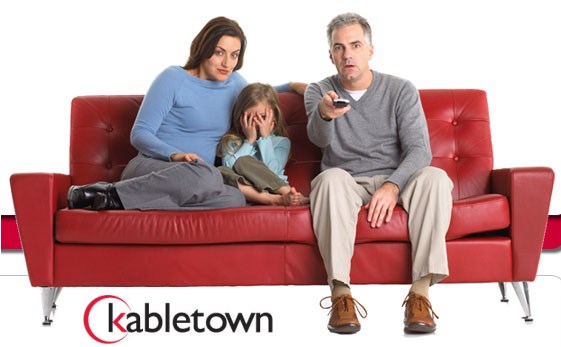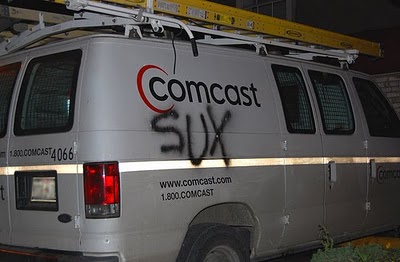
Phillip “Ouch!” Dampier
Spending the day watching cable business news channels gush approval of last night’s surprise announcement that Comcast would acquire Time Warner Cable is just one excellent reason this deal should never be approved.
CNBC, owned by Comcast, particularly fell all over itself praising the transaction. Some of the reporters — many Time Warner Cable customers — actually believed Comcast would be a significant improvement over TWC. It is, if you want higher modem rental fees, higher cable TV bills, and faster broadband speeds you can’t use because of the company’s looming reintroduction of usage caps. CNBC didn’t bother to mention any of that, and why should they? CNBC reporter David Faber was the first to break the story of the merger last evening and among the first this morning to score an extended, friendly interview with the CEOs of both Comcast and Time Warner Cable, pitching softball questions to the two of them for nearly 15 minutes.
That’s a problem. How often do you hear news reports that include the fact the parent company of the channel has an ownership interest in one of the players. Do you think you are getting the full story when a Comcast employee asks Comcast’s CEO about a multi-billion dollar deal on a network owned and operated by Comcast. Incorporating Time Warner Cable and its news operations into Comcast only makes the problem worse.
As far as cable business news networks and the parade of Wall Street analysts are concerned, this is a fine deal for shareholders, consumers, and the cable business. Ironically, several on-air reporters and commentators defended the merger claiming it isn’t an antitrust issue because Comcast and Time Warner Cable never compete with each other. They never asked why that is so.

They’re here!
Comcast is hoping the government will give its merger a pass with few conditions for the same reason, without bothering to note the cable industry has existed as a cartel in the United States for decades, each company with a territory they informally agree not to cross. With this deal, Comcast’s fiefdom will now cover about half of all cable subscribers in the U.S., covering 43 of the 50 largest metropolitan markets, and have about a 30% total market share among all competing providers — by far the largest. An 800 pound gorilla is born.
Three million current Time Warner Cable subscribers will not be coming along for the ride and will likely be auctioned off to Charter or another cable operator in a token gesture to keep Comcast’s total market share at the 30% mark the FCC formerly insisted on as an absolute ownership limit — before Comcast successfully sued to have that limit overturned.
The rest of us can say goodbye to our unlimited broadband plans and get ready to pay substantially more for cable and broadband service. Despite claims from remarkably shallow media reports, an analysis of Comcast and Time Warner Cable’s rates clearly show TWC charges lower prices with fewer “gotcha” fees.
Reviewing some recent promotional offers for new customers, Comcast customers pay nearly $35 more for a triple play package than Time Warner customers pay:

Time Warner Cable’s Rob Marcus gets a $56.5 million golden parachute after 43 days on the job as CEO.
The Comcast Starter plan costs $99 per month for the first 12 months with a 2-year agreement that includes a nasty divorce penalty. After 12 months, your price increases to $119.99 for the remaining year. The $99 plan accidentally doesn’t bother to mention that customers renting a Comcast cable modem/gateway will pay an extra $8 a month, which raises the price. Since many cable subscribers also want HD DVR service, that only comes free for the first six months, after which Comcast slaps on a charge ranging from $16-27 a month for the next 18 months. Assuming you are happy with the limited channel lineup of the Starter package (and many are not), you will pay up to $154 a month. Oh, we forgot to mention the Broadcast TV surcharge just introduced that increases the bill another $1.50 a month.
Time Warner Cable’s new customer promotions typically cost around $96 a month, including their annoying modem rental fee. DVR service can range from free to $23 a month depending on the promotion, making your monthly rate around $119 a month for 12 months, with no contract and no penalty if you decide to cancel.
“It is pro-consumer, pro-competitive, and strongly in the public interest,” said Comcast CEO Brian Roberts, defending the deal.

Actually, it is in Comcast’s interest. If approved, the biggest investment Comcast will make is spending $10 billion — not to upgrade Time Warner Cable systems — but to launch a major stock buyback program that will directly benefit shareholders.
“On a personal level, it’s never easy to cede control of a company,” said Rob Marcus, Time Warner Cable’s chief executive. “However in this case, it just makes too much sense.”
Before reaching for a Kleenex to wipe any tears away, consider the fact Marcus will do just fine giving up his leadership of TWC just over a month after taking over. His generous goodbye package is worth $56.5 million, not bad for 43 days of work. Time Warner Cable employees won’t share that bounty. In fact, with $1.5 billion in promised savings from the deal’s “synergies” — code language for layoffs, among other things — a substantial number of Time Warner Cable employees can expect to be fired during the first year of the combined company.
The biggest impact of this deal is a further cementing of the duopoly of cable and phone companies into their cozy positions. Instead of encouraging competition, Comcast’s new size-up will guarantee fewer competitors thanks to the concept of volume discounts. The largest providers get the best prices from cable programmers, while smaller ones pay considerably more for access to CNN, ESPN, and other popular channels. Comcast will benefit from reduced pricing for cable programming, which we suspect will never reach customers through price reductions. But any potential startup will have to think twice before selling television programming at all because the prices they will pay make it impossible to compete with Comcast.

Another satisfied customer
Frontier discovered this problem after acquiring FiOS systems from Verizon in Indiana and the Pacific Northwest. When Verizon’s volume discount prices expired, Frontier’s much smaller customer base meant much higher programming costs on renewal. They were so high, in fact, Frontier literally marketed FiOS customers asking them to give up fiber optic television in favor of satellite.
Unless you have pockets as deep as Google, offering cable TV programming may be too expensive for Comcast’s competitors to offer.
Broadband is already immensely profitable for both Time Warner Cable and Comcast, but now it can be even more profitable as Comcast persuades customers to adopt their wireless gateway/modems (for a price) and imposes a usage cap of around 300GB per month. Yes, Comcast will deliver speed increases Time Warner Cable couldn’t be bothered to offer, but with a pervasive usage cap, the value of more Internet speed may prove limited. It’s a case of moving away from Time Warner’s argument that you don’t need faster Internet speed to Comcast’s offer of faster speed that you can’t use.
Customers hoping for a better customer service experience may have been cheered by this misleading passage in today’s New York Times:
Nonetheless, about 8 million current Time Warner Cable customers will become Comcast customers. That may be a good thing for those customers, as Comcast is seen as an industry leader in terms of providing high-quality television and Internet services, while Time Warner Cable has a reputation for poor customer service.
It may be seen as an industry leader by Comcast itself, but consumers despise Comcast just as much as they hate Time Warner Cable. In fact, the American Consumer Satisfaction Index found Comcast was hardly a prize:
- ACSI’s lowest rated ISP
- Second-lowest ranked TV service
- Third-lowest ranked phone service
Comcast consistently scores as one of the lowest rated companies across all the segments it participates in. It has the dubious description of being the lowest rated company in the lowest rated industry.
So why the near universal disdain for ISPs? Even cable companies have to compete with satellite providers. That’s not the case here. Add to that the relatively few companies, regional near-monopolies, high costs, and unreliable service and speed and you have a recipe for bad customer service and little incentive to improve it.
Customers particularly dislike their experiences with call centers, and the range and pricing of available plans.
Higher prices, usage caps, surcharges, and fewer channels for more money. What’s not to love about that?
Just about a week ago, Rob Marcus unveiled his vision of an upgraded Time Warner Cable that looked good to us, and retained unlimited use broadband service. Apparently this is all a case of “never mind.”
The fact is, a merger of Comcast and Time Warner Cable will only benefit the companies, executives, and shareholders involved, while doing nothing to improve customer service, expand broadband, increase speeds, cut prices, and give customers the service they want. It is anti-consumer, further entrenches Comcast’s enormous market power (it also owns NBC and Universal Studios), and gives one company far too much control over content and distribution, particularly for customers who don’t have AT&T U-verse or Verizon FiOS or a community-owned provider as an alternative.
This deal needs to be rejected. When T-Mobile found itself out of a deal with AT&T, it survived on its own even better than expected. So can Time Warner Cable, with the right management team.


 Subscribe
Subscribe
Great editorial peace, Phillip!
If the merger succeeds, I hope Comcast transfers customers in the Austin area to local telcom, Grande Communications.
Grande is now offering gigabit service to residents in Austin!
http://www.austinpost.org/article/grande-communication-throws-their-hat-fiber-ring
Unfortunately, my tiny apartment complex is not on Grande’s service list.
However, many other addresses on my street are.
I wonder if the complex has an exclusivity deal with TWC?
Keep fighting the good fight, Mr. Dampier!
Curious to see how this will play out in the Austin, TX area, with Google Fiber rollout on the horizon. For now (at least) Google doesn’t plan on capping any of its plans. Not sure if they are on board with “net neutrality” however.
Unfortunately, Google Fiber is still vaporware in the Austin area, and in many parts of Kansas City.
I have a feeling it will be many years before the entire Austin metroplex is wired for Google Fiber.
I have lived near the downtown area for years (Hyde Park) and am not holding my breath waiting for Google Fiber. It still seems So Close, Yet So Far Away…
I tend to agree. It reminds me of the early days of cable where some suburbs ended up with service years before others did. But Google Fiber is much closer to you than to us in western NY.
Live in Hyde Park as well. I don’t think that neighborhood will be one of the first to get it, either. KC rollout has its problems due to politics I thought. Austin City Council seems to be very gung-ho about this rollout. I guess that is in Austin’s favor to get this to finally be something other than vaporware.
Per NY Times: “Nonetheless, about 8 million current Time Warner Cable customers will become Comcast customers. That may be a good thing for those customers, as Comcast is seen as an industry leader in terms of providing high-quality television and Internet services, while Time Warner Cable has a reputation for poor customer service” Bull S**T!!!! My kids have had experience with Comcrap and (at oeast in Rochester, NY) TWC was much better than Comcast. The principal reason is that TWC mostly uses real employees (paid by the hour and not the job) wile Comcrap mostly uses contractors (who are only… Read more »
A very informative and well written article. With the federal court recently striking down Net Neutrality I think it ‘s safe to say that these are “good old days”.
Why don’t cable companies compete against each other? You make the fact that they don’t sound like some kind of dark conspiracy to carve up markets with hidden non-compete agreements. The truth, of course, is much simpler. And to a great extent, the fault is the government’s. First, the 1992 Cable Act banned exclusive cable franchises. That was a “good thing”, right? Because no one likes a monopoly, right? In theory, it was a “good thing”. But the devil, as usual, is in the details. Second, while anyone could apply for an additional franchise, how exactly were they supposed to… Read more »
txpatriot said: “Because unlike the telephone world, the cable companies were under no legal obligation to share or lease their infrastructure to competitors” That is not always the case: I know that Time Warner in Rochester, NY WAS required to lease their infrastructure to others. As a result, one in that area could get Internet from Earthlink, as well as Time Warner (and often at better rates). Perhaps a requirement (contact your senator/congressman) is a similar requirement for the Comcast buyout of TWC. On the other hand: would such a requirement discourage Comcast from making improvements (such as Fiber to… Read more »
This is completely out of hand! Why should the majority of us have to be at the mercy of ONE major ISP? This system we have with the Telecoms is broken due to little to no competition and Congressional law, which another poster pointed out. Its unfortunate that so many of us rely on Internet nowadays for a lot more than just surfing the web and checking emails. Also, Its ironic how this all happens around the same time that the ISPs start moving closer to Fiber to the Home. It appears that ISPs still refuse to pony up the… Read more »
This has been out of hand for a long time now, local incumbents either don’t have to lease the infrastructure or the buy in is so high that another option won’t ever happen. Consolidated Communications noted that Google Fiber was of no real threat to them, it’s just business as usual. In fact, some of the copper lines here prob date back to the 1900’s as I have seen some dial up connections that barely exist. Companies like Netflix or Hulu won’t survive where caps exist and DSL connectivity in many areas can’t sustain UHD delivery. Cable has the capacity,… Read more »
You’re right to note that Time Warner Cable customers should be concerned, but I will argue the big concern is much less direct here, and even extends to consumers who don’t subscribe to Comcast or Time Warner. It’s not the subscriber end that I think we should be most worried about, but the backbone and intermediate parts of the network. The competitive picture for that part of the internet is very different from the last-mile part. I’d love for someone to correct me if I’m wrong, but I would presume this deal consolidates a very large fraction of the backbone… Read more »
If allowed you’ll see them exerting pressure back on small to mid-sized content producers and TV networks, given their combined size just denying to carry or deliver content could destroy a company that needs access to their TV customers too. People are going to keep focusing on the net neutrality and consumer implications of this deal, but these mega billion dollar mergers never serve the public or consumer interest unless you’re a banker, lawyer, executive, or shareholder cashing in. We need a modern day Ma Bell breakup of these companies to split and firewall their divisions breaking up the parts… Read more »
“Back to the media conflict of interest: note that while Time Warner Cable was spun off from Time-Warner 4 years ago, the spin-off was not a sale, but a stock split. So unless there have been some major shakeups in the top shareholders, the same people who are benefiting at Time Warner Cable from this deal also own Time Warner the media company.”
The two companies are TOTALLY and UTTERLY separate.
@ Loons, you’re not understanding what I’m saying. They are officially separate, but that doesn’t mean they aren’t related. They are owned by many of the same people, because they were separated by spinning off one from the other. The way this was done was to effectively register them as separate companies, then declared the shareholders of that owned the former joint company each own proportional stakes of the two separate companies. I’ve been through this myself with one of the stocks own. I know how it works. The ownership will, of course, have changed in the 4 years since… Read more »